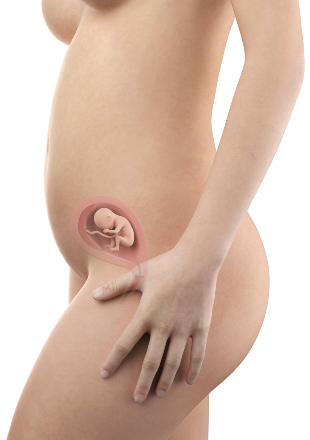Welcome to Week 15! By now, you’re settling into your second trimester—a phase many women find more comfortable and energizing. Your baby is growing quickly, and you might start to notice some exciting changes in your body and how you feel. This is a time to embrace new developments, take good care of yourself, and look forward to what’s ahead.
In the past weeks, you may have experienced symptoms like tiredness, nausea, or mood swings. Many moms notice these symptoms start to fade by Week 15. That said, every pregnancy is unique, and some women may still feel a little off or notice new symptoms as their bodies adjust.

Inside your belly, your baby is now about the size of an apple, measuring around four inches long. Their tiny muscles and bones are getting stronger each day. Exciting news—your baby can move all their joints now and might even be making little facial expressions! Some moms start to sense the first gentle flutters (“quickening”) from their babies around this time, but if you haven’t yet, don’t worry—from one pregnancy to another, this can feel different.
You may begin to notice changes in your appearance, too. For example, your growing uterus might create a subtle baby bump, and some moms find their hair or nails getting stronger. On the flip side, you might spot starker veins on your skin or notice increased nasal stuffiness—both are normal during pregnancy.
Week 15 is also an important time to keep up with healthy habits:
- Stay hydrated: Carry a water bottle with you.
- Eat balanced meals: Focus on fruits, veggies, lean proteins, and whole grains.
- Keep moving: Gentle exercise (like walking or prenatal yoga) can boost your energy and mood.
If you have an appointment with your healthcare provider this week, they might listen to your baby’s heartbeat or discuss upcoming screening options. Don’t hesitate to ask any questions—your peace of mind matters every step of the way.
Remember, everyone’s journey looks a little different. Give yourself plenty of grace, trust your instincts, and cherish these special moments—Week 15 is another beautiful milestone on your path to motherhood.
Your Baby’s Development This Week
Welcome to week 15! By this point, your little one is moving through some exciting changes, and you may find it easier to picture the newborn you’ll soon meet. Let’s take a closer look at what’s happening in your baby’s world right now.
Rapid Growth and a Stronger Body
Your baby is about the size of a small apple—measuring nearly 4 inches from head to bottom—with a weight of about 1.5 to 2.5 ounces. This week, their bones are getting firmer as calcium is added, which means the skeleton is becoming stronger. If you had a peek with an ultrasound, you would notice the outline of tiny bones, as well as arms and legs that look much more like a newborn’s.
As those bones get sturdier, your baby is also practicing their new moves in the womb! Their muscles are getting stronger, allowing for all sorts of gentle action: toe wiggles, arm stretches, even small kicks. You probably won’t feel these just yet, but your baby is definitely getting in a daily workout and discovering how their limbs move.
Little Details Are Appearing
This week, your baby’s appearance is changing in sweet ways. Eyebrows are beginning to fill in, and soft hair is forming on the scalp, hinting at the hairstyle they might have at birth. Their ears, which started lower on the neck, are now moving into place on the sides of the head—almost where they’ll be for life!
Inside, your baby’s organs are hard at work. The kidneys are producing urine, which is released into the amniotic fluid, a normal and healthy part of development. The heart keeps pumping strong, moving blood through tiny vessels as your baby continues to grow.
- Senses begin to awaken: The ears are now close to their final spot, and believe it or not, your baby may start to notice muffled sounds—like your heartbeat and voice—from outside the womb.
- Skin is see-through: The skin is still thin and delicate, with tiny blood vessels visible underneath. Over the weeks ahead, this skin will thicken and be covered by soft protective hair called lanugo.
What You Can Expect at Week 15
- Most women still can’t feel fetal movement just yet, but some may notice the first gentle flutters over the next few weeks.
- Your baby’s body is rapidly developing its own rhythms, including periods of sleep and wakefulness.
- The placenta is fully formed and providing everything needed for growth—nutrients, oxygen, and protection from many infections.
Each day, your little one is becoming more active and more like the baby you’ll soon hold. For now, your best job is to nurture yourself—which in turn supports all these remarkable changes inside. Regular meals, plenty of fluids, and gentle movement will help both you and your baby thrive as you move through this magical stage together.
Changes in the Mother’s Body
Reaching week 15 of your pregnancy can feel like you’re turning a corner. Many women find this stage brighter and a bit more comfortable than the early months. Your little one is continuing to grow quickly—and so are the changes happening in your body. Knowing what to expect can help you feel more at ease and ready for the wonderful journey ahead.
One of the most noticeable changes is your belly. By now, your uterus has likely grown enough that friends or family may spot your emerging bump. You might find that your favorite jeans fit a little tighter or that you’re ready for some comfortable, stretchy waistbands. Your growing belly is a special reminder of the new life developing each day!
As your body adjusts, you might observe a few other changes:
- Posture and Comfort: As your belly expands, your center of gravity shifts forward. You may notice a small change in the way you stand or walk. Some women find themselves stepping a little more carefully or feeling mild backaches, especially after a long day. Wearing supportive shoes and practicing good posture can make a big difference. If you’re experiencing discomfort, gentle stretching or prenatal yoga can be helpful.
- Increased Circulation: With your heart working harder to pump extra blood for your baby, you might feel warmer than usual or notice a rosy glow on your cheeks. Some women even feel bursts of energy they haven’t had in weeks. Embrace these moments, but also be kind to yourself on days when you need more rest.
- Skin Changes: Your skin may look or feel different now. Thanks to pregnancy hormones, you might notice your nipples and areolas getting darker, or a faint line—called the linea nigra—starting to appear running from your belly button down to your pubic bone. Some women develop mild spots or pigment, but this is usually temporary and fades after pregnancy.
- Breast Growth: Your breasts may continue growing or feel fuller. It’s normal for bras to feel snug or for you to need extra support. Soft, wire-free maternity bras can offer better comfort during this period.
- Vaginal Discharge: Increased clear or white discharge, called leukorrhea, is normal and helps protect against infection. If you notice any strong odor, itching, or discomfort, let your healthcare provider know, as these could be signs of infection.
- Digestive Changes: With a growing uterus pressing gently on your stomach and digestive organs, heartburn or constipation can become more noticeable. Eating smaller meals, drinking plenty of water, and choosing high-fiber foods can help ease these symptoms.
Emotionally, you may feel your mood leveling out as early pregnancy worries fade and excitement grows. Some women report feeling more “like themselves” again, though occasional mood swings remain common. It’s okay to seek support or talk things through with loved ones or your doctor if you need reassurance.
Finally, your appetite may be increasing! It’s perfectly normal to feel hungrier as you move into the middle months. Listening to your body and choosing healthy, satisfying snacks can help you feel your best. If you’re still waiting for first trimester nausea to disappear, remember—everyone’s timeline is a little different.
Remember, every pregnancy is unique. If you have concerns or anything feels unusual, don’t hesitate to reach out to your care team. You’re doing a wonderful job, and your body is working hard to nurture your growing baby.
Your Week 15 Checkups: What to Expect at the Doctor’s Office
Reaching week 15 in your pregnancy means you’re just into your second trimester—a time when many moms start to feel better and your baby is growing fast! At this stage, regular medical checkups are all about making sure both you and your baby are healthy and thriving.
Here’s what you can expect:
- Routine Health Checks: During your visit, your doctor or midwife will check your weight and blood pressure. These simple checks help spot any changes that deserve attention, like high blood pressure that could indicate complications later on.
- Urine Test: You’ll likely be asked to provide a urine sample. This test helps your provider check for protein or sugar in your urine, which can be early hints of gestational diabetes or preeclampsia—even though you may feel perfectly fine!
- Hearing Baby’s Heartbeat: This is one of the most exciting parts of your visit. Your provider will use a special device called a Doppler to let you listen to your baby’s heartbeat—a sweet, reassuring sound for parents-to-be.
- Screening for Birth Defects: If you choose, your doctor may recommend a blood test called the “Multiple Marker Screen” (sometimes called triple or quad screen) between now and week 20. This test looks at certain substances in your blood to estimate the chance of some birth defects, like Down syndrome or neural tube differences. The results help decide if any further testing may be helpful.
- Checking in on Symptoms: Your provider will ask about your general well-being—are you feeling less nauseous, getting back your energy, or having any new symptoms? This is the time to mention things like unusual pain, headaches, or swelling, as these can be important clues about your health.
- Planning for Upcoming Ultrasound: Depending on your care plan, your doctor may talk with you about scheduling your second trimester ultrasound. Many women have this detailed scan around 18-20 weeks, but preparations and scheduling may happen now.
Don’t forget: there are no silly questions! Use this visit to share any worries, ask about common changes you’re noticing, and confirm you’re on track with important supplements like iron and prenatal vitamins. Keeping up with these checkups is one of the best ways to support your baby’s healthy development—and your own well-being too.
Nutritional Tips and Physical Exercise
At week 15, your baby is growing quickly, and so are their needs. Taking care of your body—and fueling it well—will help both of you feel your best. Let’s explore some fresh tips that can make eating and moving a positive part of your routine.
- Snack Smart: It’s common to feel hungrier now, so try keeping healthy snacks on hand. Fresh fruit, unsalted nuts, whole grain crackers with hummus, or a slice of cheese are easy choices that offer lasting energy and important nutrients.
- Boost Your Fiber: Growing babies can sometimes leave moms feeling constipated. Aim to include foods like oatmeal, berries, sweet potatoes, and lentils most days. Fiber supports digestion and helps keep you comfortable.
- Power Up with Iron and Vitamin C: To help prevent anemia, pair iron-rich foods (such as spinach, beans, eggs, or lean beef) with vitamin C sources like oranges, strawberries, or bell peppers. Vitamin C helps your body absorb iron better.
- Keep Fluids Flowing: Try to sip water regularly throughout the day, even if you aren’t thirsty. Consider adding a slice of lemon or a few berries for flavor. Proper hydration can ease headaches, support circulation, and reduce swelling.
- Mindful Mealtimes: Eating slowly and in a calm environment can help you recognize when you’re full, and lessen any feelings of heartburn. If possible, enjoy meals seated and without rushing.
- Supplement Smarts: If you’re not sure you’re getting enough calcium or vitamin D, ask your provider whether you need a supplement, especially if you follow a dairy-free or plant-based diet. These nutrients are vital now for growing bones.
- Gentle Movement Matters: Most women benefit from staying active if pregnancy is uncomplicated. A brisk walk, swim, or prenatal yoga class can lift your mood and boost energy. Aim for about 30 minutes most days, but listen to your body—rest if you need to.
- Simple Strength: Light resistance exercises (like wall pushups or lifting light grocery bags) can help keep muscles strong. Include safe movements for your core and back, which may help reduce aches as your bump grows.
- Stretch and Relax: Stretching gently—especially your back, legs, and neck—can ease tension and help you stay flexible. A few relaxing stretches before bed can also help you unwind and may support better sleep.
- Stay Safe: Always avoid high-impact or risky activities, such as contact sports or anything with a risk of falling. If you ever feel dizzy, short of breath, or have any pain while moving, stop and check in with your doctor.
Every mom and pregnancy is unique, so adjust these tips to suit your comfort and preferences. Trust how you feel, and don’t hesitate to reach out to your healthcare team with questions about food or movement. Taking small, positive steps can make a big difference as you and your baby grow together.
Weekly Checklist
You’re entering a wonderful new phase of your pregnancy journey at 15 weeks! Your baby is growing fast, and your body is working hard to support that little one. Here are some thoughtful steps to take this week that can help you and your developing baby feel your best.
- Notice Your Changing Body: Take a moment to notice any changes in your belly and posture. If you’re feeling a little off-balance, consider using supportive shoes or a maternity belly band for extra comfort.
- Schedule Your Next Prenatal Visit: Be sure your next check-in with your healthcare provider is on the calendar. Bring a list of questions—no question is too small when it comes to your growing baby!
- Learn About Upcoming Tests: Ask your provider about screening tests offered between weeks 15 and 20, such as the triple or quad blood screen. Knowing what’s ahead can help you feel prepared and less anxious.
- Add a Nutritional Boost: Include an extra snack with protein and healthy fats—for example, yogurt with nuts or whole grain toast with avocado—to meet your second trimester energy needs.
- Hydrate, Hydrate, Hydrate: Carry a water bottle and sip often! Proper hydration helps with digestion, healthy skin, and supports your increased blood volume during pregnancy.
- Pay Attention to Your Weight: Try to step on the scale at home about once a week. Steady, gradual weight gain helps your provider track your and your baby’s growth. If anything changes suddenly, mention it at your next visit.
- Try Gentle Movement: If your provider gives the green light, activities like walking or prenatal yoga can relieve backaches and boost energy. Listen to your body—rest when you need to.
- Wear Comfortable Clothing: As your bump grows, gentle, stretchy clothes can make daily life cozier (and help you feel good, too!).
- Focus on Emotional Wellbeing: Many moms notice mood swings or forgetfulness right now. Simple routines, gentle walks, or talking with a friend can help you feel more balanced.
- Celebrate Small Milestones: Pause to notice new things, like a rounder belly or changing appetite, and give yourself credit. Every week means a stronger, growing baby—something worth celebrating!
If you ever feel unsure about a new ache or symptom, reach out to your healthcare team—they’re there to support you every step of the way. Take care, enjoy the changes, and know you’re doing a wonderful job!
When to Call Your Doctor
Even though week 15 is often a time when you start feeling a little better, it’s important to stay alert to changes in your body and reach out to your doctor if anything seems out of the ordinary. Trust your instincts—if something doesn’t feel right, your care team would rather hear from you and reassure you than have you worry at home.
Here are some signs and symptoms that deserve a call to your provider:
- Strong or Persistent Cramping: Mild twinges can be normal as your uterus grows, but if you have sharp, severe, or ongoing pain in your lower belly, it’s best to check in.
- Bleeding or Spotting: Light spotting sometimes happens, but new bleeding, anything heavy (soaking a pad in an hour), or bleeding with pain should always be reported.
- Sudden Fluid Leakage: If you notice a gush or continuous trickle of clear fluid from your vagina, call your doctor. This might signal your water has broken, even though this is rare at 15 weeks.
- Severe Headache or Vision Changes: If you have a pounding headache, blurry vision, flashing lights, or spots that don’t go away, these could mean your blood pressure is too high and need to be looked at quickly.
- Fever or Chills: A temperature above 100.4°F (38°C) or shaking chills may signal an infection and should be discussed with your care team.
- Painful Urination or Back Pain: Burning when you pee, frequent urges to go, or aching in your lower back can be signs of a urinary tract infection, which is important to treat during pregnancy.
- Persistent Vomiting: If you can’t keep food or liquids down for more than 24 hours, let your provider know. Staying hydrated is important for you and your baby.
- Less Frequent or No Movement Later On: While it’s still early to reliably feel kicks, if you’ve felt movement before and suddenly notice it’s stopped, it’s worth checking in—even though many moms don’t feel the baby yet at this stage.
- Swelling of Face or Hands: Swelling in your ankles is common, but if you notice puffiness in your face, around your eyes, or sudden swelling in your hands, don’t hesitate to call—it could be a sign of high blood pressure.
- Breathe Trouble or Chest Pain: If you feel short of breath at rest, have chest pain, or notice a racing heart that doesn’t slow down, seek help right away.
Remember, you know your body best. If you have a symptom that isn’t listed here but concerns you, don’t wait—reach out to your healthcare team. They’re there to support you every step of the way on your pregnancy journey.
Preparations for Baby
As your baby keeps growing and changing, it’s a wonderful time to start laying the groundwork for a cozy, loving home. Every small step you take now can make life easier for both you and your little one later.
Here are some thoughtful ways to get ready during week 15:
- Begin a Journal: Write down your feelings, hopes, and even questions you have. Later on, this can be a beautiful keepsake to look back on or share with your child.
- Set Up a Relaxation Spot: Choose a calm corner at home where you can rest, read, or just take a break. This will be your go-to spot during those tired or emotional days in pregnancy and after baby arrives.
- Start Gathering Essentials: Make a simple list of basic items your baby will need, such as a crib, onesies, diapers, and blankets. No need to buy everything at once—instead, use this time to research what feels right for your family and budget.
- Explore Childcare Options: If you’ll need childcare after your baby is born, look into local options now. Ask friends for referrals or start a list of questions to ask care providers.
- Connect With Your Support System: Reach out to friends, family, or local mom groups. Building relationships with people you trust will come in handy when you need advice or a helping hand.
- Simplify Household Routines: Tidy up and organize one area of your home each week. Keeping things simple will save you time and stress when you’re caring for a newborn.
- Create a Family Bonding Tradition: Begin reading or singing to your belly. Even if your baby can only hear muffled sounds right now, these early moments can start your connection and become a sweet habit.
- Check In With Your Emotions: Carve out a little time each week to reflect or talk about how you’re feeling with your partner or a close friend. It’s normal to have ups and downs, and sharing can make a big difference.
Remember, you don’t have to do everything at once. Every step you take, no matter how small, is a way of showing love to your growing baby—and to yourself. Give yourself credit for how far you’ve come!
Citations and References
- Mayo Clinic – Provides a week-by-week guide for pregnancy, including fetal growth, maternal changes, nutrition, and screening information for week 15. Visit Source
- The American College of Obstetricians and Gynecologists (ACOG) – Offers guidelines for routine prenatal care, recommended screenings in the second trimester, and nutrition during pregnancy. Visit Source
- Centers for Disease Control and Prevention (CDC) – Details on fetal development milestones, maternal health, and safe weight gain recommendations during pregnancy. Visit Source
- World Health Organization (WHO) – International standards and nutritional requirements during pregnancy, including daily caloric and micronutrient advice. Visit Source
- Cleveland Clinic – Provides an overview of week 15 pregnancy, fetal development, maternal symptoms, and prenatal checkups. Visit Source
- National Institutes of Health (NIH) – MedlinePlus – Information regarding fetal development, healthy pregnancy nutrition, and screening tests during the second trimester. Visit Source
- March of Dimes – Week-by-week pregnancy guidance, including fetal anatomical changes, emerging symptoms, and the importance of prenatal vitamins and screenings. Visit Source
- Health Service Executive (HSE) Ireland – Evidence-based advice on nutrition, fetal development, prenatal checkups, and maternal health for the second trimester. Visit Source










